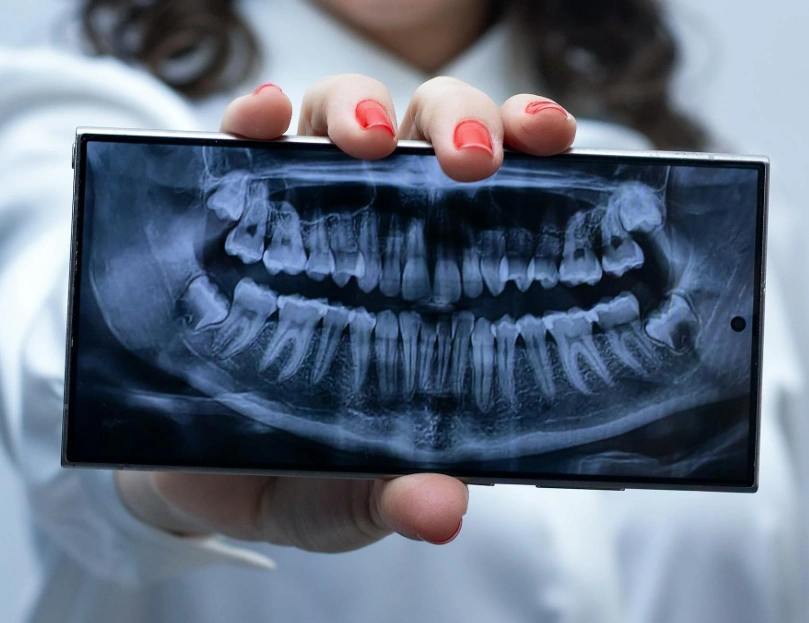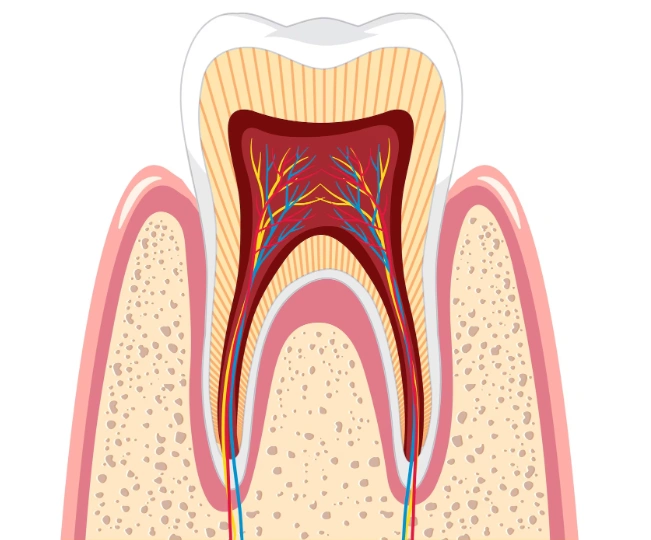Nerves of Teeth: Structure, Pain, and Treatment Options!

First things first, it’s not breaking news that teeth are not only meant for bubblegum chewing or taking a perfect selfie. In fact, behind each and every shining tooth is a world of sensitivity evoked by the presence of something hardly anybody thinks of: the tooth nerves.
These small dynamites are really the cause of your sensing, reacting, and sometimes even occurring to protect your mouth from bigger dental problems. But only when they are… malfunction? Nature will put you through intense pain. If you’ve ever bitten a tender nerve on a lump of ice cream or had a severe throb lingering all night long, then I guess, in a quite cruel way, you have met your tooth nerve.
Quality dental treatment is not only the right of European citizens but also of anyone who comes to Lema Dental Clinic in Istanbul, Turkey. To diagnose nerve problems, we use the latest technology, such as digital X-rays and 3D imaging. Additionally, the dental expertise of our staff and our minimally invasive techniques allow us to select the least painful, most efficient, and long-lasting alternatives to achieve a Hollywood Smile for you.
What Are Dental Nerves and Where Are They Located?

Let’s do a brief exploration of your tooth from the interior to the exterior.
Each tooth comprises three main parts:
- Enamel – the hard covering of the crown (it is comparable to a helmet).
- Dentin – richer in nerves and blood vessels, the yellowish middle layer.
- Pulp – the inside of the tooth, which is home to the nerves, the blood vessels, and the connective tissue.
It is the soft pulp where the main trigger of the senses is. This pulp spreads all the way down through the long and thin channels called root canals, and is the one that keeps the tooth connected to the jawbone. Look at the dental pulp as the brain of your tooth; it always functions well and adapts to its surroundings.
Though not visible, tooth nerves are the most powerful because they are capable of detecting heat, cold, pressure, and mainly, pain. Nerve impulses are the body’s way of alerting the brain to something unpleasant that needs to be removed.
What the Nerves of Tooth Teach about Oral Health
What is the significance of having tooth nerves? Can we not live without them, pain-free?
Indeed, the presence of tooth nerves is very much needed. The reasons why tooth nerves are important are as follows:
- Protection: Nerves tell you that you could have a damaged or infected tooth, so you can take no chances of mistaking a small trouble for a big one.
- Sensation: It is the nerves that allow us to feel textures, which is important in chewing and speaking with precision.
- Circulation: The pulp that covers the nerves sustains the tooth with necessary nutrients and a blood supply, especially while the tooth is developing.
Your tooth nerves are a part of your body’s alarm system. If you don’t have them, things such as cavities or cracks can go undetected until the tooth breaks off. Ah!
Are the Nerves in the Teeth Directly Connected to the Brain?
Yes, for sure. The teeth are connected to your brain by one of the most important nervous system pathways in your face, the trigeminal nerve. It’s the biggest cranial nerve and has three branches that go to the eye, the upper jaw, and the lower jaw, respectively.
It is a great revelation because dental pain is not only felt in the teeth but also radiates to the ear, jaw, and even the head. It is further highlighted by the fact that even mild cavities can seem an outright emergency sometimes. The nerve is the carrier of the message, and it travels light and strong together.
As a negative input can be a trigger for dental anxiety, f.e, when one’s brain remembers the hurting that a tooth caused, it doesn’t forget that punch. However, take it easy because with today’s dental care services, the procedure of the tooth nerve treatment is almost painless.
The Most Common Causes of Tooth Nerve Pain

Could you tell us what the things are that always start tooth nerve’ problems? Here are the chief suspects:
1. Tooth Decay (Cavities)
The acidic environment created by the plaque on the tooth is responsible for the decay. The decay first erodes the enamel, and once it reaches the tooth’s dentin, and then the pulp, the nerve is exposed, and the result is the characteristically severe pain.
2. Infection (Abscess)
If bacteria invade the pulp, it will become infected. Even though the body does everything in its power to eliminate it, the infection does not stop until it becomes so painful that it necessitates a root canal.
3. Trauma or Fracture
An irregularly aligned or broken tooth, no matter how minimal it is, can directly expose or be the cause of the nerve being in an irritable state. At other times, the nerve is only slowly dying, which makes it all the more frustrating not only for one but also for the dentist, who might be helpless in solving such a situation, and ultimately, discoloration of the tooth also happens.
4. Grinding (Bruxism)
When you gnash or gnash your teeth, the immediate result is that the enamel will wear off and the dentin will become greatly exposed; the next stage then is the increased sensitivity of the tooth itself. brute pressure is now laid on the pulp, and it leads to inflammation over time.
5. Recent Dental Work
On some occasions, a pulp-adjacent filling or crown can be the reason behind a certain level of discomfort for the nerve. Generally, it eases off on its own, but in more severe cases, medical attention is called for.
6. Gum Recession
Both receding gums and advancing years, in addition to one’s diet and tooth brushing habits, can make the tooth root come into sight. The aforementioned root does not possess enamel, and as a result, the nerves of the tooth can be easily angered by the heat or the cold.
How to Keep Your Teeth Nerves Healthy
We are realistic; you simply cannot ignore using your teeth. However, you can be gentle with them.
🔹 Practice Next-Level Oral Hygiene
Make sure to brush your teeth with fluoride toothpaste twice a day. Floss daily. Use antibacterial mouthwash. These are not things you can choose to do; they are your first line of defense against the unknown.
🔹 Cut Back on Sugar
If the plaque is fed with sugar, the outcome is decay. Reduce those snacks that are full of sugar and acidic drinks such as soda, especially in between meals.
🔹 Use a Night Guard
A custom night guard can not only protect your enamel and reduce nerve stress, but also give you a great sleep if you are a teeth grinder.
🔹 Avoid DIY Whitening
DIY products for teeth whitening, which are commonly sold over the counter, can not only be the reason for the irritation of your pulp, but also worsen your problems of sensitivity. The best-known procedure for safe and sound teeth whitening is to consult a dentist.
🔹 Don’t Skip Checkups
The dentist visit every 6 months will not only help you identify problems at an early stage but also save you from nerve damage. The less painful and low-budget the treatment is, the better.
Treatments for Tooth Nerve Pain

Your tooth is causing pain; where do you go from here?
Below, you will find some of the most commonly used relief methods for nerve-related dental problems:
🦷 Dental Fillings
When the cavity is minor and not affecting the root of the tooth, a filling can heal the tooth and leave you infection-free.
🦷 Root Canal Treatment
Tooth root canal treatment involves the removal of the damaged pulp, cleaning the root canal, and finally, sealing the tooth to prevent any dirt or germs. Besides that, the procedure remains non-painful, allows the patient to keep the tooth’s structure, and also ensures the healing of the tooth.
🦷 Tooth Extraction
In the event that the tooth has reached the point of severe injury to be saved, it will have to be pulled out. A dental implant or a bridge may be the way to fill the void.
🦷 Dental Crowns
A crown is a shield that guards your tooth, just like a helmet. It preserves a tooth that is now fragile or has undergone some form of treatment from sensitivity and further damage.
🦷 Antibiotics
In cases of infected teeth, the administration of antibiotics is a common treatment method that may be followed by other means to get rid of the infection before a procedure.
FAQ: Frequently Asked Questions About Tooth Nerves
Yes! Through the trigeminal nerve, tooth nerves send pain and pressure signals directly to your brain.
Common causes include deep cavities, dental infections, trauma, grinding, or even gum recession exposing the sensitive root.
In mild cases, inflammation may calm down. But once the nerve is seriously infected or dead, professional dental treatment is needed.
Sharp, throbbing pain, sensitivity to hot and cold, swelling, or pain when chewing are all signs that your tooth nerve may be inflamed.
Treatment may involve a filling, crown, root canal, or extraction, depending on the severity. Antibiotics might also be prescribed if there’s an infection.




